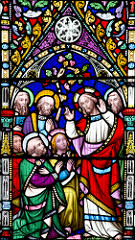
The most solid argument I have read about what the word in Luke 1:2 translated as “eyewitnesses” actually means is by John N. Collins: see the post What Did Luke’s Eyewitnesses See? Collins presents a cogent argument that the word really means officials who have the responsibility for the writings/library of the community: it is their job to assess and preserve the authenticity of the documents entrusted to them — they are “specially authorized guarantors of the traditions.”
But in this post I am backtracking and working from the assumption that the word does convey the idea of one who sees firsthand some event. What I am saying here is this: What if the word really did express the idea of a witness? What does such a witness mean for Luke?
Norman Perrin answered this question nearly forty years ago in Rediscovering the Teaching of Jesus.
Firstly, Perrin begins by reminding modern readers that they must leave behind their modern conceptions and make an effort to enter the world of the biblical authors. Get out of your heads any modern notion of what the word “eyewitness” means to us today who are familiar with the concept from our newspaper reports and court proceedings:
If we resolutely ban from our minds . . . what a modern writer would mean by an ‘eyewitness’ and ask ourselves what Luke meant by the expression . . . . (p. 27)
Perrin’s conclusion?
Luke considers Paul an eyewitness!
Perrin explains:
The actual word used in Luke 1:2, autopai, does not occur again in Luke-Acts, but it is paralleled in meaning in the words which Luke has Ananias say to Paul in Acts 22.14f.: ‘The God of our Fathers has appointed you . . . to see the Just One and to hear the voice from his mouth, that you may be a witness to him . . .’, and the risen Lord to him in in Acts 26.16: ‘I am Jesus . . . for this reason I have appeared to you, to appoint you a minister and witness . . .’ (p. 28)
Perrin glides over as a technical variation the different words Luke uses. Here, really, is a point in favour of John Collin’s argument. But let’s follow Perrin’s point:
Any attempt to argue for accuracy of the tradition so far as the historical Jesus is concerned on the basis of Luke’s use of ‘eyewitness’ is to fail to take into account the clear fact that he, like Paul, absolutely identifies the risen Lord and earthly Jesus and so regards Paul as, in effect, an ‘eyewitness and minister of the word’.
I am sure most New Testament scholars have read Perrin’s books. So I can only wonder why I have read so many of their appeals to Luke 1:2 as evidence that Luke was drawing upon oral traditions from literal eyewitnesses (in our modern sense of the term) without any engagement with this point made by Perrin in 1976. Norman Perrin is not even listed among the index of modern authors in Richard Bauckham‘s Jesus and the Eyewitnesses.
Perrin effectively undermines the only text in the New Testament to which scholars can appeal as explicit evidence for the narratives of the Gospels deriving from oral reports relaying what someone literally saw with their own eyes.
Simultaneously he does open up the ground for the traditions inherited by Luke being derived from visions and spiritual inspiration. If so, the historical basis for the crucifixion narratives is as solid as that for the resurrection narratives.
If you enjoyed this post, please consider donating to Vridar. Thanks!

Note that Luke does not claim to have spoken to the eyewitnesses himself. He says that their accounts were “passed down to us”.
“Note that Luke does not claim to have spoken to the eyewitnesses himself. He says that their accounts were “passed down to us”.”
I have pointed that out myself a few times when debating with apologists. I’ve never gotten a response yet. So far, my interlocutors have always immediately changed the subject.
Doug wrote: “So far, my interlocutors have always immediately changed the subject.”
That’s the deal. And if you meet them again and resume the discussion, they’ll return to their checklist. “What about Luke’s introduction?”
It’s the same with people who claim not to be apologists. They bring up the Testimonium Flavianum, and if you press them hard enough they might finally admit that, yes, even if it were partially authentic, it only proves that Josephus was aware of Christian claims about Jesus. So what? But resume the discussion a few days later, and they’ll start back on their checklist. “What about Josephus?”
Welcome to Groundhog Day.
It’s a variant of prooftexting. They learn their catechisms and their proof-texts to protect their foundations. You don’t argue with proof-texts unless you’re a heathen.